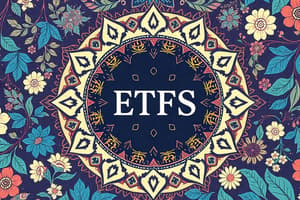Podcast
Questions and Answers
Cosa significa ETF?
Cosa significa ETF?
- Exchange-traded funds (correct)
- Exchange-traded products
- Exchange-traded notes
- Exchange-traded commodities
Quale società non emette ETF?
Quale società non emette ETF?
- BlackRock
- Vanguard
- State Street Global Advisors
- Hmark (correct)
Cosa significa ETP?
Cosa significa ETP?
- Exchange-traded products (correct)
- Exchange-traded funds
- Exchange-traded notes
- Exchange-traded commodities
Qual è il vantaggio fiscale degli ETF rispetto ai fondi comuni d'investimento?
Qual è il vantaggio fiscale degli ETF rispetto ai fondi comuni d'investimento?
Qual è il mercato ETF più grande d'Europa?
Qual è il mercato ETF più grande d'Europa?
Qual è la differenza tra ETN ed ETF?
Qual è la differenza tra ETN ed ETF?
Cosa significa Hmark?
Cosa significa Hmark?
Come vengono negoziati gli ETF?
Come vengono negoziati gli ETF?
Cosa succede automaticamente all'ETF per farlo corrispondere all'indice di riferimento?
Cosa succede automaticamente all'ETF per farlo corrispondere all'indice di riferimento?
Qual è il vantaggio di utilizzare gli ETF per le strategie di copertura e vendita allo scoperto?
Qual è il vantaggio di utilizzare gli ETF per le strategie di copertura e vendita allo scoperto?
Flashcards are hidden until you start studying
Study Notes
- Hmark is an ETF provider.
- The ETF will follow the reference index components and weights.
- There is no need for investor intervention in rebalancing.
- ETFs are traded on the stock exchange.
- Hmark is followed regardless of convenience.
- The ETF is automatically adjusted to match the reference index.
- Investors do not need to rebalance the ETF.
- ETFs are traded in negotiated accounts.
- Hmark is an independent ETF provider.
- The ETF is uniform to the reference index.
- ETFs are exchange-traded funds that track the performance of an index or a basket of assets.
- ETFs trade like stocks and can be bought or sold throughout the trading day.
- ETFs have lower fees than mutual funds and can be more tax-efficient.
- ETFs are highly liquid and can be easily traded on stock exchanges.
- ETFs can provide exposure to a wide range of asset classes, including stocks, bonds, commodities, and currencies.
- ETFs can be used for short selling and hedging strategies.
- Italy's ETF market is one of the largest in Europe, with 440 ETFs traded on the Milan Stock Exchange as of June 2010.
- ETPs are a family of exchange-traded products that include ETFs, ETNs, and ETCs.
- ETNs and ETCs are different from ETFs in that they are notes or bonds rather than funds and are subject to counterparty risk.
- ETFs are issued by various companies, including BlackRock, Vanguard, and State Street Global Advisors.
Studying That Suits You
Use AI to generate personalized quizzes and flashcards to suit your learning preferences.



